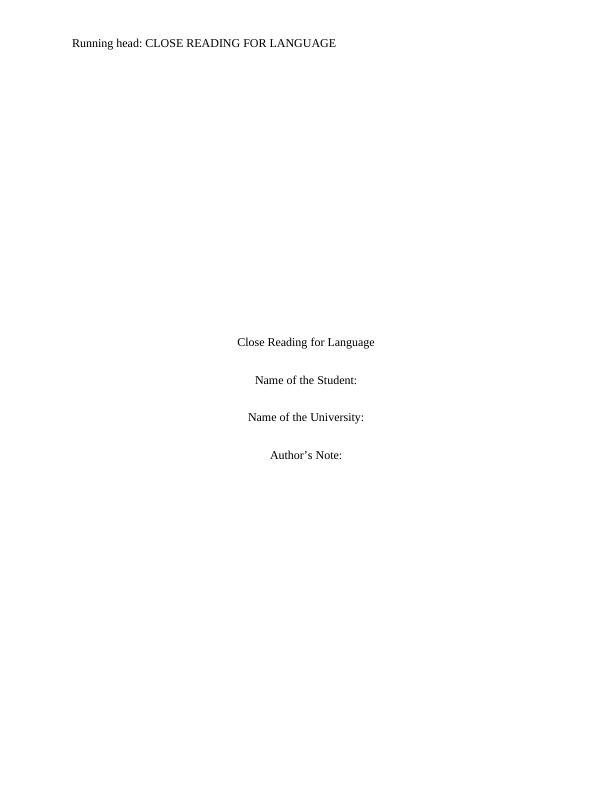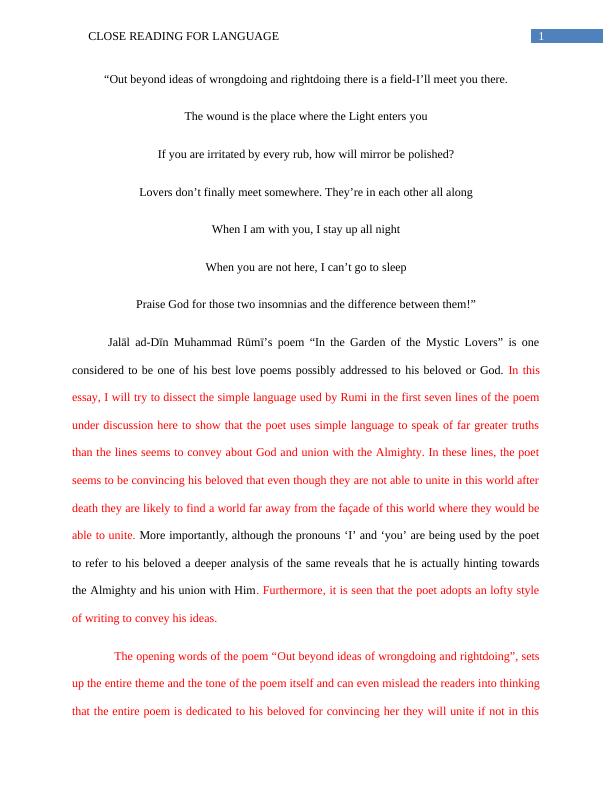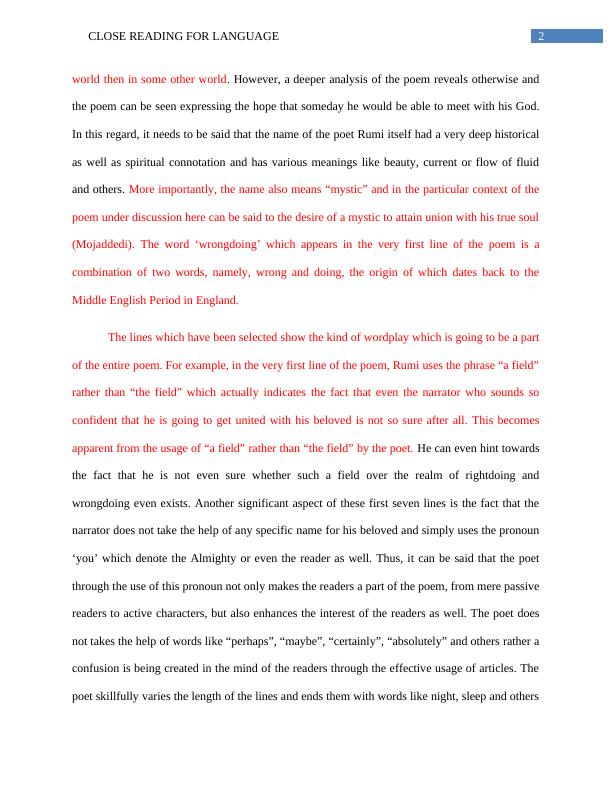Close Reading for Language
Added on 2023-04-05
7 Pages1896 Words267 Views
Running head: CLOSE READING FOR LANGUAGE
Close Reading for Language
Name of the Student:
Name of the University:
Author’s Note:
Close Reading for Language
Name of the Student:
Name of the University:
Author’s Note:

1CLOSE READING FOR LANGUAGE
“Out beyond ideas of wrongdoing and rightdoing there is a field-I’ll meet you there.
The wound is the place where the Light enters you
If you are irritated by every rub, how will mirror be polished?
Lovers don’t finally meet somewhere. They’re in each other all along
When I am with you, I stay up all night
When you are not here, I can’t go to sleep
Praise God for those two insomnias and the difference between them!”
Jalāl ad-Dīn Muhammad Rūmī’s poem “In the Garden of the Mystic Lovers” is one
considered to be one of his best love poems possibly addressed to his beloved or God. In this
essay, I will try to dissect the simple language used by Rumi in the first seven lines of the poem
under discussion here to show that the poet uses simple language to speak of far greater truths
than the lines seems to convey about God and union with the Almighty. In these lines, the poet
seems to be convincing his beloved that even though they are not able to unite in this world after
death they are likely to find a world far away from the façade of this world where they would be
able to unite. More importantly, although the pronouns ‘I’ and ‘you’ are being used by the poet
to refer to his beloved a deeper analysis of the same reveals that he is actually hinting towards
the Almighty and his union with Him. Furthermore, it is seen that the poet adopts an lofty style
of writing to convey his ideas.
The opening words of the poem “Out beyond ideas of wrongdoing and rightdoing”, sets
up the entire theme and the tone of the poem itself and can even mislead the readers into thinking
that the entire poem is dedicated to his beloved for convincing her they will unite if not in this
“Out beyond ideas of wrongdoing and rightdoing there is a field-I’ll meet you there.
The wound is the place where the Light enters you
If you are irritated by every rub, how will mirror be polished?
Lovers don’t finally meet somewhere. They’re in each other all along
When I am with you, I stay up all night
When you are not here, I can’t go to sleep
Praise God for those two insomnias and the difference between them!”
Jalāl ad-Dīn Muhammad Rūmī’s poem “In the Garden of the Mystic Lovers” is one
considered to be one of his best love poems possibly addressed to his beloved or God. In this
essay, I will try to dissect the simple language used by Rumi in the first seven lines of the poem
under discussion here to show that the poet uses simple language to speak of far greater truths
than the lines seems to convey about God and union with the Almighty. In these lines, the poet
seems to be convincing his beloved that even though they are not able to unite in this world after
death they are likely to find a world far away from the façade of this world where they would be
able to unite. More importantly, although the pronouns ‘I’ and ‘you’ are being used by the poet
to refer to his beloved a deeper analysis of the same reveals that he is actually hinting towards
the Almighty and his union with Him. Furthermore, it is seen that the poet adopts an lofty style
of writing to convey his ideas.
The opening words of the poem “Out beyond ideas of wrongdoing and rightdoing”, sets
up the entire theme and the tone of the poem itself and can even mislead the readers into thinking
that the entire poem is dedicated to his beloved for convincing her they will unite if not in this

2CLOSE READING FOR LANGUAGE
world then in some other world. However, a deeper analysis of the poem reveals otherwise and
the poem can be seen expressing the hope that someday he would be able to meet with his God.
In this regard, it needs to be said that the name of the poet Rumi itself had a very deep historical
as well as spiritual connotation and has various meanings like beauty, current or flow of fluid
and others. More importantly, the name also means “mystic” and in the particular context of the
poem under discussion here can be said to the desire of a mystic to attain union with his true soul
(Mojaddedi). The word ‘wrongdoing’ which appears in the very first line of the poem is a
combination of two words, namely, wrong and doing, the origin of which dates back to the
Middle English Period in England.
The lines which have been selected show the kind of wordplay which is going to be a part
of the entire poem. For example, in the very first line of the poem, Rumi uses the phrase “a field”
rather than “the field” which actually indicates the fact that even the narrator who sounds so
confident that he is going to get united with his beloved is not so sure after all. This becomes
apparent from the usage of “a field” rather than “the field” by the poet. He can even hint towards
the fact that he is not even sure whether such a field over the realm of rightdoing and
wrongdoing even exists. Another significant aspect of these first seven lines is the fact that the
narrator does not take the help of any specific name for his beloved and simply uses the pronoun
‘you’ which denote the Almighty or even the reader as well. Thus, it can be said that the poet
through the use of this pronoun not only makes the readers a part of the poem, from mere passive
readers to active characters, but also enhances the interest of the readers as well. The poet does
not takes the help of words like “perhaps”, “maybe”, “certainly”, “absolutely” and others rather a
confusion is being created in the mind of the readers through the effective usage of articles. The
poet skillfully varies the length of the lines and ends them with words like night, sleep and others
world then in some other world. However, a deeper analysis of the poem reveals otherwise and
the poem can be seen expressing the hope that someday he would be able to meet with his God.
In this regard, it needs to be said that the name of the poet Rumi itself had a very deep historical
as well as spiritual connotation and has various meanings like beauty, current or flow of fluid
and others. More importantly, the name also means “mystic” and in the particular context of the
poem under discussion here can be said to the desire of a mystic to attain union with his true soul
(Mojaddedi). The word ‘wrongdoing’ which appears in the very first line of the poem is a
combination of two words, namely, wrong and doing, the origin of which dates back to the
Middle English Period in England.
The lines which have been selected show the kind of wordplay which is going to be a part
of the entire poem. For example, in the very first line of the poem, Rumi uses the phrase “a field”
rather than “the field” which actually indicates the fact that even the narrator who sounds so
confident that he is going to get united with his beloved is not so sure after all. This becomes
apparent from the usage of “a field” rather than “the field” by the poet. He can even hint towards
the fact that he is not even sure whether such a field over the realm of rightdoing and
wrongdoing even exists. Another significant aspect of these first seven lines is the fact that the
narrator does not take the help of any specific name for his beloved and simply uses the pronoun
‘you’ which denote the Almighty or even the reader as well. Thus, it can be said that the poet
through the use of this pronoun not only makes the readers a part of the poem, from mere passive
readers to active characters, but also enhances the interest of the readers as well. The poet does
not takes the help of words like “perhaps”, “maybe”, “certainly”, “absolutely” and others rather a
confusion is being created in the mind of the readers through the effective usage of articles. The
poet skillfully varies the length of the lines and ends them with words like night, sleep and others

End of preview
Want to access all the pages? Upload your documents or become a member.
